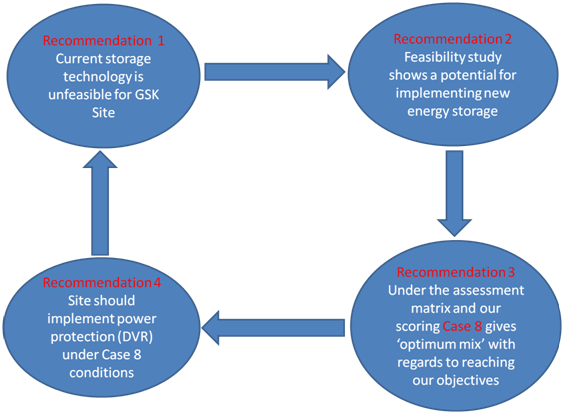Project Outcomes: Our Recommendations for the Site
Recommendations
The diagram below describes the four main outcomes/recommendations that we have concluded as a result of the technical and economic modelling and further investigations. It is important that we produce certain conclusions and recommendations for the GSK site based on our project results. The previous section describes the outcomes of the project in terms of the assessment matrix and how this was used to develop our own project conclusions, as well as leaving the tool open and free for use in another project. Under this assessment matrix we discovered the final and best cases for the GSK site in terms of the original objectives to be achieved and what was considered more important in the implementation of the renewable sources. In our project we deemed that CO2 neutral was one of the most important factors to consider in the modelling of the site. However it was important to look at other factors such as decreasing grid interaction and to make the site more autonomous. We realised that a storage technology would be needed in order to reach these goals but after some investigations into current technologies deployed, we concluded that there was no suitable existing storage technology that would meet the large capacity needed for the GSK site, which would be both at a low cost and at a high efficiency. Our second recommendation follows on from the first conclusion in terms of new energy storage. This is regarding liquid air energy storage as a serious possibility for the site, as this technology has some major benefits over existing technologies, for example liquid air could meet the capacities needed for power storage at a much lower cost, using readily available, mature and efficient components. However, we concluded that this may be a possibility for the future and therefore recommendation 3 for the project was that the site should implement renewable technologies under the Case 8 model. As previously mentioned, under these conditions, the site is able to meet some of the requirements such as becoming CO2 neutral through the deployment of large scale biomass CHP. The only issue arising from the project was that the site would in fact have to be connected to the GRID at all times, and would therefore not be able to run fully autonomous (Island Mode). This would mean that the site would be susceptible to power quality problems and it was therefore necessary to look at how to manage these issues. Recommendation 4 has been concluded from the investigation into power protection technology, and we thought that in order to reduce costs and improve power quality into the site, it would be necessary for GSK to implement power protection technology (DVR).
